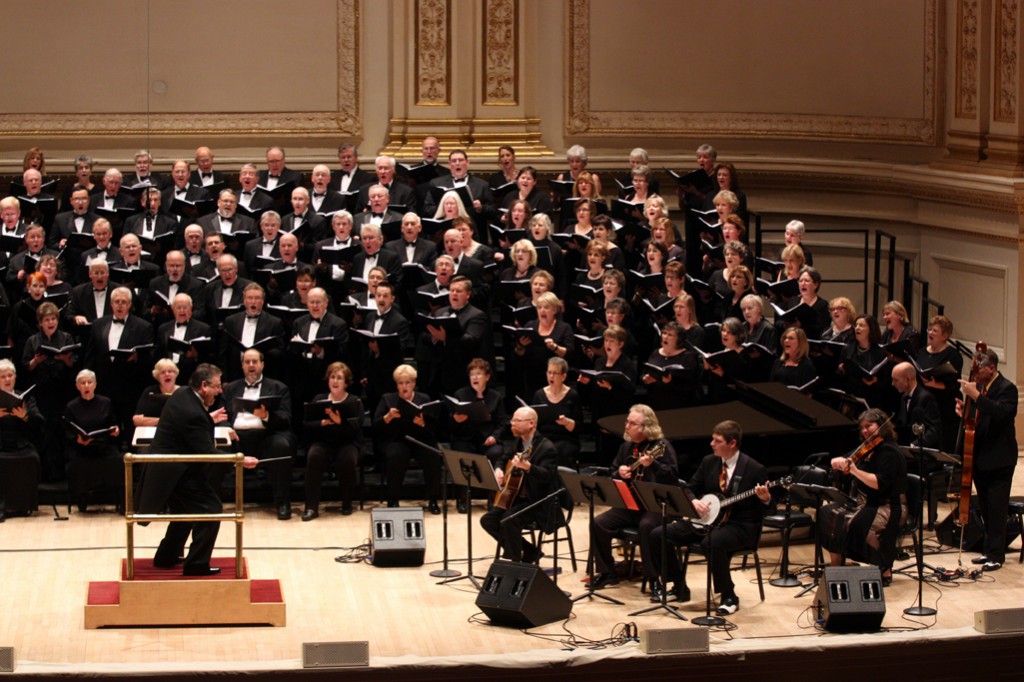On November 29, Distinguished Concerts International New York (DCINY) presented a concert entitled With Grace: The Music of Gwyneth Walker. There was a festive mood in the air as the audience members happily saluted their favorites. I was seated next to a group of very enthusiastic alumnae from Saint Mary’s Women’s College in Indiana, each of whom had a sleigh bell to ring with delight when the members of that school’s choir took to the stage. “The Bells of Saint Mary’s, you know,” one of these ladies quipped to me. It was yet another reminder about the DCINY experience – joy abounding for performers and audience members. One might think that this listener, a veteran DCINY concert attendee, would be jaded about this, but it still delights me, and I suspect it always will.
The first half showcased the talents of New York’s own SoHarmoniums, and the second featured the music of the well-loved Gwyneth Walker, with chorus members from Colorado, Indiana, Michigan, Pennsylvania, Virginia, and Canberra, Australia. It was a wonderful way to kick off the holiday season.
SoHo based group SoHarmoniums took to the stage for the first half. Led by Elizabeth McKinney Núñez, this fifty- member women’s ensemble joined with the Distinguished Concerts Orchestra, and proved to be a well-prepared ensemble that delivered excellent performances. Opening with The Tree of Peace, adapted from the poem “O Brother Man” by John Greenleaf Whittier, the tone was set- this was not to be a “glee club” performance. It was full of import, well-controlled harmonies, and tight balance. This song was followed by a polished rendering of “O Lovely Peace” from George Frideric Handel’s Judas Maccabeus. The next work, Garland, featuring four poems of Emily Dickinson (Is Heaven a physician?, Crumbling is not an instant’s act, We cover thee, and The life we have is very great), was an orchestration by Jim Papoulis of an original composition by Mark Adamo. The essence of Dickinson’s poetry was captured in many ways – there is at times an otherworldly feel, at other times hectic and harried, and often just morose; I believe, however, that this large-scale idea is less well-suited to her poetry than the original scoring. The sparseness of the poetry cries out for a similar approach. The performance, though, was truly exceptional.
After this, we heard the song South Sámi People (Åarjel Saemieh), by Frode Fjellheim (b. 1959), whose work has gained interest largely based on his work “Vuelie”, which is the title song for Frozen, the Disney mega-blockbuster. This piece is based on the Sámi style of yoik, an ancient chanting tradition. It is thought that there are fewer than two hundred people who still speak South Sámi today. The music has a primitive, tribal feeling, with an infectious rhythmic quality. It was an effective and clever antidote to the Dickinson work. To end the half, the SoHarmoniums let loose in an unabashedly fun-filled Joy to the World/Joyful, Joyful, which can be simply described as a “Joy to the World” and “Ode to Joy” mash-up. It was a sure-fire crowd pleaser and a happy ending that won the hearts of the audience.
After intermission, conductor Nancy Menk took to the podium to lead in a selection of works by American composer Gwyneth Walker (b. 1947). She reinforced my already favorable opinion of her work by her strongly focused approach. Ms. Menk runs a tight ship, and the results bear this out in fine performances.
Opening the half was I Thank You God, using text from E.E, Cummings. It was surprisingly weighty to me, perhaps based on my over-exposure to Cummings’s lighter works. At any rate, I was completely won over by the end. It was a great start to the half, and it gave this listener a healthy appreciation for Ms. Walker the composer.
Songs for Women’s Voices No. 1-6, from the 1992 choral cycle of the same name, followed. The texts for these songs comes from the poetry of May Swenson (1913-1989). Before each song, each poem was recited from the stage. The narrator was DCINY’s own Andrea Macy, who projected the various qualities of the poems, some sassy, some serene, others searching for meaning, with a strong dramatic sense, strong and confident, but never resorting to over-emoting or “hamming it up”. These are the works of a skilled composer, rich in melodic invention, without being trite or derivative. It is easy to understand Ms. Walker’s popularity when one hears a cycle like this. Highlights for this listener were the second song “Mornings Innocent” with its “natural”, pastoral qualities, the interweaving of voices in “The Name is Changeless [God]”, and the resigned feeling that remained unresolved on “In Autumn” [I Will Lie Down].
It was a good programming to follow with the light, happy feelings in This Train. Crossing the Bar was a simple, poignant, “heart-on-sleeve” piece that was magical. Ms. Walker came to the stage at the end of the piece to the cheers of the audience.
SoHarmomiums joined with the Distinguished Concerts Singers International in a spirited performance of How Can I Keep From Singing? to end the night with a bang. The audience loved it and jumped to their feet to salute the performers, and Ms. Walker, who returned to the stage once more to collect her richly deserved accolades from the appreciative audience. It was a fitting close to a most enjoyable evening.






